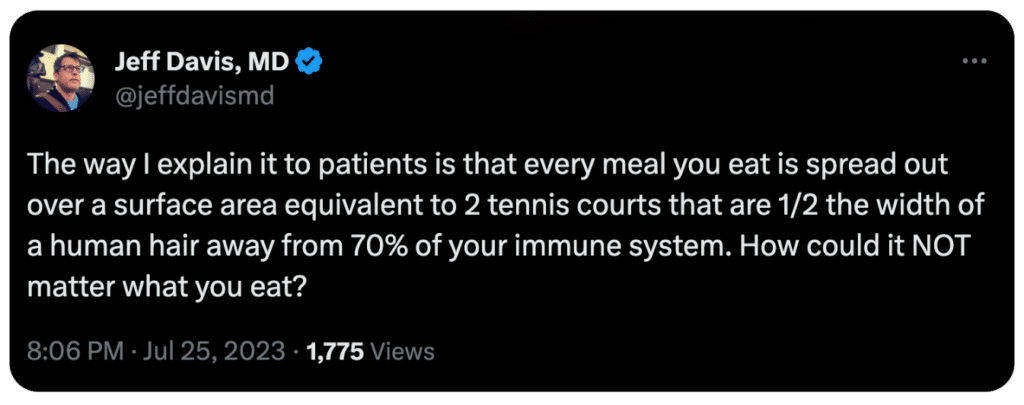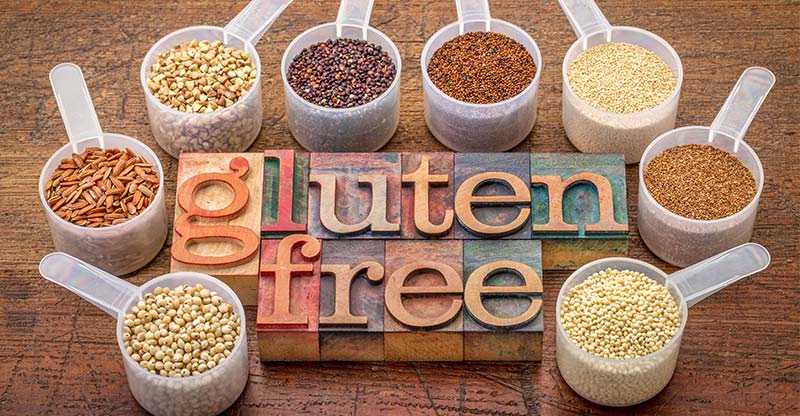I’ll try not to let myself rant too much on this subject, but it’s something I feel very strongly about! After living with Ulcerative Colitis for eight years now, I’ve learned a thing or two about Gastroenterologists, and that is they never want to hear the two words: food matters.
My horrible experience with Gastroenterologists
I saw so many Gastroenterologists in when I first developed my Ulcerative Colitis (UC) symptoms. Every Gastroenterologist (GI) I talked to said that what I ate didn’t matter, and if I simply took the prescribed medicine, I would be fine. My GI literally said, and I quote:
“Oh ya, you can still eat at Taco Bell. Just take the Lialda.“

I’ve been on Lialda, Colazal; you name it, and I’ve probably tried it some point. Well, guess what? Even on these medications, I didn’t get any better. After doing more research, I finally decided to quit the medication and go a more natural route with my diet. After all, how could a disease of the colon not be affected by food passing through it? Also, I had already arrived at the point where I really had nothing to lose.
Fast forward a couple of months, and my symptoms were pretty much gone. I had a checkup with my GI and told her what I had been doing. I told her that I quit my medication a while back, without her permission, and she looked at me with disbelief.
I told her my symptoms were pretty much gone, only by changing my diet. She couldn’t accept that my diet is what had helped me. Long story short, I ended up walking out of her office after telling her I wouldn’t ever be back. And thanks for the help, or rather misleading me for months?
People need to remember that GI’s are medical doctors. They went to medical school and are trained by professors and textbooks. Well, guess what? What I do for a living is nothing I learned in school; I taught myself everything. And I would like to think I am pretty good at it. Personal experience is sometimes the best experience.
GI’s, unless they have been through the pain of living with a digestive issue, have no clue what the experience is really like. Sure they can read that people have pain, but it’s not the same. I’m sure anyone with Ulcerative Colitis, Crohn’s, Celiac Disease, or any type of digestive issue, will agree with me on this one.
When you’re experiencing pain, it impacts your entire life (from the moment you wake up to the moment you go to bed), and it’s almost impossible to think bout anything else.
Then, there is that “brushed aside” feeling you get at the end of your GI appointment. It makes you wonder what the point of all this is? Do they even care at all?

Find me a GI that has Ulcerative Colitis, and I might listen. I’m sure they exist but are probably very rare. I live in Scottsdale, AZ (6+ million people), and have yet to find one. But I can tell you who not to visit, haha.
In the end, I learned that food matters, and I need to listen to my body. Do the research and don’t always solely rely on what doctors are telling you. I’m not saying all doctors are wrong, but this is one area where I think it’s a lot worse than others. There is so much that science has yet to understand about these types of diseases.

Having digestive issues? Here’s what to do
From the bottom of my heart, I hope some of the following tips help you on your journey. I’ve learned all this the hard way over years of trial and error and wish I had something like this when I was in agony. It’s not easy, but the important thing to focus on is that it can get better. I went from completely rock bottom (literal hospital beds) to becoming a CMO at a fast-growing tech company. I now run my own business.
1. Get your blood tested
The first thing you should do if you are having digestive issues is to get your blood tested, both for Celiac Disease and gluten intolerance. You need to eat gluten right up until the test for it to work accurately. I had my test done with my primary care physician, but most labs can now do it. My gluten intolerance was off the charts, even though I didn’t test positive for Celiac Disease. I later found out I had Ulcerative Colitis.
2. Get a vitamin deficiency test
Many people with digestive issues have vitamin deficiencies and may not even know it. I was severely low on iron and had to take supplements to get back up to normal levels. Don’t assume your vitamins are in check; just get the test. I recommend doing this even for healthy people. Again, my primary care doctor did this.
3. Get a food panel/allergy test
This is another thing I’ve found that many don’t know. Doctors can draw your blood and then test it against all sorts of different foods. I got a 250 food panel blood test and an amazing report back with foods I needed to stay away from. Gluten was bright red on my chart. I had other odd ones such as cantaloupe, brown rice, etc. This significantly helps speed up trial and error.
If your primary care doctor can’t do this, ask where you can get it done.
4. See naturopathic doctor or nutritionist
Before going to a GI, I recommend seeing a naturopathic doctor or a nutritionist. Both can give you alternative ways to deal with your digestive issues. Their solutions are way less expensive, safer, and less invasive. I sat down with a nutritionist for an hour after getting my food panel results, and we worked out a whole plan together. Nutritionists can be very helpful!
5. Go gluten-free
After you have had all your tests done, this is the most critical next step. Go gluten-free; trust me. After two weeks of eating gluten-free and cutting out the bad foods from my food panel, I saw a complete 180 in my symptoms. By going gluten-free, you’ll most likely feel better, have more energy, and be more alert.
I’ve been gluten-free now for over four years and couldn’t be happier. It’s a journey, you pretty much have to re-learn what to eat, but it’s worth it. One reason I started this blog was to help others learn how eating gluten-free doesn’t have to be hard. Especially these days, there are a lot of options.

Also, eat lots of blueberries and bananas. Most people generally tolerate these two fruits. Bananas are a more accessible source of fiber (which is hard for people with digestive issues to get sometimes), and blueberries are excellent for gut flora and your immune system.
6. Create a food journal
A food journal is something everyone with a digestive issue should be keeping at the start. Thankfully if you get a food panel test, this becomes a lot easier, but keeping a food journal will help you narrow down exactly what causes pain and discomfort. Then it’s as simple as staying away from those foods. Sometimes, in the beginning, this means eating a lot of the same thing and introducing new foods slowly. It’s a process, but it works.
7. Food exclusion diet
This can sometimes go hand in hand with creating a food journal and getting a food panel/allergy test. A super-easy way to see if changing what you eat helps is to go on a food exclusion diet. Start with simple foods, one or two, that you know don’t irritate your stomach, and go from there. You want to focus on keeping track of the foods you have to exclude from your diet.
My recommendation would be to start with something like bananas and lactose-free yogurt. Those are two things my body tolerates well. Slowly build up your list of foods from there and exclude everything that causes you discomfort. And of course, as I said above, keep a food journal to remember which foods you can and cannot eat.
It’s important to listen to your body.
8. Caffeine, switch it up
So my one weakness has always been caffeine. I used to drink a Grande Raspberry Mocha every day from Starbucks. Unfortunately, my stomach can no longer tolerate regular milk, soy milk, or coconut milk. 😢
I finally switched to almond milk. I’ve done lots of research on milk, soy milk, coconut milk, etc. over the past year, and many people don’t realize all of the benefits that almond milk has! Almond milk also settles fine with my stomach. Make sure to get the unflavored kind if you are cooking and the brand without carrageenan.
I’ll admit it; I drink a lot of Starbucks coffee. My guilty pleasure right now is an almond milk latte with no flavors. I’ve found that getting it with no flavors helps a lot. But it’s an acquired taste.
I hopefully don’t have to state the obvious, but if you can cut caffeine out of your diet altogether, by all means, go for it! I’m just not quite there yet.
9. Exercise more
Exercise is so important to your overall health and well-being. When you exercise, you simply feel better, period. This was hard for me at the start because I was always in pain. So introduce this more and more as you start feeling better.
10. Relax more
Relax more! Anyone that has lived in chronic pain probably knows not to take any day for granted. Life is way too short! One thing that I did to relax more was that I started seeing a chiropractor. I’m a skinny guy and have always had joint issues. Seeing a chiropractor for me is very therapeutic, and I always leave the Chiro office feeling like a weight has been lifted off my shoulders. Find ways to relax, whether it’s a massage or a bubble bath.
11. Supplements
I’m not a huge fan of lots of supplements, but there are a few which speed up the healing process in your gut. I have linked the exact products I use:
- Metamucil: Adding fiber to my diet did wonders; check out my Metamucil review.
- A multivitamin is always good, especially if you have vitamin deficiencies like I did.
- Probiotic: I recommend something over 25 billion strains and one that is refrigerated. Ultimate Flora was on the only one my stomach liked. You could also do a probiotic lactose-free yogurt.
- L-Glutamine powder: I take this mixed with lactose-free yogurt every day.
- Glycine and L-Proline: Have you heard of bone broth? These are the healing ingredients in bone broth.
12. Drink lots of water
I drink a lot more water than I did when I was a kid. I prefer drinking alkaline water. I believe keeping as much acidity out of my body, the better. There’s some controversy over whether higher PH water helps or not. But opinion aside, it’s healthier than soda. Beware of products like Propel, as they are way more acidic. It would be better to drink tap water than a lot of sports drinks.
I also drink a lot of Spindrift, which is sparkling water without any artificial sweeteners. This actually helped me completely quit my soda habit. It has just enough flavor and in my opinion, tastes better than some of the alternatives like LaCroix.
13. Get more fiber
I can’t stress this enough, get more fiber! After chatting with many people who’ve had Ulcerative Colitis and Crohn’s Disease, introducing more fiber seems to always come up in conversation. Taking Metamucil before each meal and eating bananas on a regular basis has done wonders for me.
14. Last resort: See a Gastroenterologist
If you’ve tried everything above and still aren’t seeing results, then I do recommend seeing a gastroenterologist. You might need to get an endoscopy (esophagus, stomach, small intestine) or colonoscopy (large intestine, colon, rectum), which can only be performed by a medical professional.
Summary: Food matters
Again, I’m not a medical professional, but I urge you to research yourself before wasting tens of thousands of dollars (yes, that’s how much I’ve spent) on doctors. Unlike what GI’s will tell you, food matters! Everything we put into our bodies affects us in some way or another, for good or bad.
If this was helpful, or you know someone that this article might help, please share it.


I can relate. I was having all kinds of digestion problems. I had no insurance and barely any money, but after a little research I went gluten free. Less than two weeks later I was back to normal. The current Doctor I go to now has a daughter with a gluten intolerance and is very knowledgable about this subject. She even says staying away from gluten will help with my arthritis. My weight dropped just by going gluten free, I just started eating differently. No exercise or anything, it just dropped off(40lbs). I would recommend this for anyone even if you don’t have problems.
Wow, glad to hear that Jon! You are lucky to find a doctor who understands first hand what really is going on. That’s amazing to hear your results from going gluten-free. Yes, there are so many benefits from eating-gluten free. I put together a list of 10: https://nogluten.com/benefits-of-eating-gluten-free/ I will have to add weight loss to it :) Thanks for sharing.
Brian, thanks for your website. I’m a physician (primary care) and I agree with you that sometimes us doctors focus too much on what we learned in school or find in the literature. All of my digestive problems disappeared completely after going gluten-free, and since then I always take patients seriously when they say they can’t tolerate something, and I always tell them that diet matters, exercise matters, enjoying life matters. Lately I’ve had joint problems and I was ready to go on the immune suppressants the specialists recommended, but I’ve managed to put it off thanks to a ton of metamucil and probiotics, so I’m going to check out some of your other recommendations like bone broth. I think I’d probably end up before the review board if I recommended a gluten free diet for everyone, but I get around it by telling them to limit junk food (and then list a bunch of high-gluten items like beer and pizza). Good luck with all your endeavors!
Wow, thanks for taking the time to comment Carrie! It’s great to hear from a physician, and one that admits that they aren’t perfect. I know there are a lot of great doctors out there, but unless they have experienced UC, Celiac, or Crohn’s it is really hard for them to relate with how diet truly affects our digestive system and our entire well being.
Glad to hear you found relief with gluten-free like I did! I too am a huge believer in Metamucil and probiotics. It’s a much healthier and cheaper way to get symptoms under control. Lots of those medicines like Lialda have horrible side effects, I have tried them all. Thanks again for stopping by.
Hi Carrie, this is a completely different track but just to offer up an alternative for the chronic pain. Check out the book Healing Your Back Pain by John Sarno. I read that book and another by a patient of his, adopted the beliefs he presented, and within 2 weeks had ended 12 years of chronic joint pain (primarily lower back, but also knees, shoulders and more). This was 2.5 years ago now and I have the occasional flare-up every few months during stressful times that last a couple of days, but then they go away. So I went from 12 years of nearly constant chronic pain, to the occasional bad day. Good luck.
Hey Will, it’s awesome you bring that up. I actually have a post about TMS on here: https://nogluten.com/repetitive-strain-injury/ I had issues with RSI and now work on computer 18 hours a day. I am even backing their current Kickstarter project to release Sarno’s video :) I really do believe that it plays into my UC as well.
And yes Carrie, you should check it out!
Great to hear Brian, had no idea you’d gone through something like that as well. I saw the Sarno video project after it was kickstarted but purchased the DVD last year (still looking forward to it!). I’ve learned quite a bit about this since my experience and want to move into helping people with chronic pain as I believe in the US we’re in the 100s of millions of people who suffer from it, most needlessly.
Right now I do digital marketing and I’m on the computer a lot, although you have me beat with the 18 hours per day, I’m not (usually) at that level! Even still, on top of the other pain I mentioned, prior to curing myself I also had carpal tunnel for a few months in my mouse hand, which got extremely painful, and also had vertigo 2 or 3 times (I forget). That scared the crap out of me. And there was more.
I read your post and I had a similar experience. MRI, surgeon telling me I had basically no fluid in my lower discs and the back of a 50 year old, but to avoid him since surgery usually didn’t work,. Years of trying different methodologies (yoga, MELT, Foundation Training, etc), lots of gadgets, some of which provided temporary relief, and tons os frustration and hopelessness.
I ‘m sure it plays a role with UC as well. It’s funny, I just spoke today with a woman who experiences physical symptoms that are textbook TMS, and I told her about my experience. I know it was her first introduction to the possibility of what I was saying, but she was receptive to it, which was cool.
Excellent blog. I’d add that it’s essential for people with UC to try an exclusion diet. I found that by eliminating all dairy, all fruit, all cabbage family (incl mustard & cress etc), all sugarbeet family (incl beet sugar and spinach) and all pepper family, I also eliminated UC from my life and haven’t had a relapse or symptoms for 10 years while I’ve stuck to it. It was all about allergies to those things. I also found that whilst I can tolerate gluten perfectly well, any bread which has “flour improver” containing ascorbic acid in it, also causes me to have a major relapse. Bread without it is actually quite hard to find – you really do have to read the small print! Ciabatta bread and rye loaves tend to be OK, but the latter contains an awful lot of roughage which may be too much for some guts!
Hey Ruth! Thanks for stopping by. I have added exclusion diet to the list above now :) This goes great along with a food journal and food panel test. Focusing on foods that you need to stay away from should definitely help people, it sure did for me. There are strange things that I can’t eat like cantaloupe.
Interesting feedback about the bread, and congrats on the 10 years! That is awesome.
Hello Brian, thanks for your reply.
Your comment re cantaloupe is one I find particularly interesting, as I’ve been baffled for many years as to why I can eat cucumbers, courgettes, marrows and squashes without a problem – yet can’t touch melon (in UK – I think it translates as canteloupe in the US?!) without a major relapse. As they’re the same plant family (Curcurbita), I’m guessing it must be something to do with the sugars in the melon/canteloupe? which don’t exist in the vegetables in the family. But as I’m OK with sucrose and dextrose as far as I’m aware, it’s very strange. Unless maybe there’s some acid in the canteloupe which isn’t in the vegetables?
PS Really pleased you’ve added exclusion diets to the list above, thank you.
I’ve been saying this since I realised food does matter, I can relate to everything you have written and can’t erge people enough to try everything you’ve recommended
. I’ve done so much of my own research while being ill, I really believe our gut is our second brain. I was already GF before I had UC but have since gone diary free too which has really benefited me.
Thanks Leanne! I can’t agree more. Our gut and brain are connected in ways science can’t even explain yet. I am also dairy free. My biggest struggle is caffeine at the moment. Sometimes a gluten-free almond milk Latte from Dutch Bros is still my guilty pleasure :) The important thing is staying away from the gluten for me.
I recently noticed a lot of bloating and gastritis pain when eating gluten. Now I’m also noticing head cold like symptoms after eating it. I don’t want to be carafate dependent again so I’ve avoided the doctors since it’s usually a pill with them. I now just avoid gluten as best I can. I don’t panic if I have it accidentally because I am still learning. In order to have this proven by the medical community though, I need to eat gluten. How can I explain or avoid this so I don’t have to make myself sick to be validated.
Also, you can add all varieties of GoGo Squeez applesauce to your GF list.
Hey Mary,
Hope you are doing better now. Have you tried going on a completely gluten-free diet or getting a food panel test? Thankfully eating gluten-free today is a lot easier than it was even 5 years ago. I’m always happy to see more and more options for food. :)
Will get GoGo Squeeze added! Thanks
Hi Mary,
Unfortunately, as far as I know, doctors need to get the correct tests to validate a diagnosis. That’s why I haven’t done it. I’ve been off gluten since I was eight and refuse to make myself sick just to have them tell me what I already know. I was diagnosed with arthritis which went into remission once I was off gluten. It’s not just risking my intestinal wellbeing just to prove it, but also my joints. So, I am not going to do it any time soon.
There are benefits to having it recognized, when you see new or different doctors and you have this diagnosis then you don’t have to re-explain it. I’m posting from Canada, here you can get some financial relief for needing to buy gluten free food, but only if diagnosed. I think it is up to each of us to decide if it’s worth it. In the meantime, we can validate one another’s experiences.
I disagree with using Metamucil..it has Psysillium Husks in it and can become dangerous with prolonged use, it scrapes the lining of the colon, I had a friend die of Rectal Cancer, she has used Metamuscil for over 17 years. My Gastro Dr told me this, he has me on Myralax, daily forever, I need the fiber, plus it keeps my slow system moving great. (and I am a Celiac patient…100% Gluten Free…so wonderful to not have to live in the Bathroom and no sudden urges). Sandi Smith…I’m on Facebook..(Saundra Wheeler Smith
Hey Sandi,
Ya, I’ve heard from many doctors there is nothing wrong with taking Metamucil long-term and than other say there is. The GI docs at this point I think are just guessing. I take them for the extra fiber which actually causes the reverse on my system, it firms up my stools so that I don’t have to go to the bathroom 20+ times a day. Once I add fiber, I’m back to normal. Trying to introduce other means of fiber though so I don’t have to rely on pills.
Here’s what worked for me: My MD was kind enough to do a Celiac test on me, but by then I had been gf for over a week. So it was negative. However, he didn’t do a thorough one, and based on my experience he decided I was NCGS and directed me not to eat gluten. I then developed a moving pain that ended on my ileus and stayed there. Thinking I had appendicitis, I went to the ER and that doctor sent me to a gastro eventually. The gastro was experienced in Celiac and I have a family history of UC. So he backed up my MD and said I should consider myself Celiac because one can trigger the other in people with my genetics.
On a practical level, I also learned that I had a massive problem with fiber so for a long time I used a diverticulitis diet (no fiber, no bits of food, so for example, nut butter ok, nuts chewed, not ok), and I had several courses of antibiotics to stop the local infections. Afterward, I was unable to tolerate probiotics or fiber at all. It took careful planning to restart my gut flora and now I can digest soft beans like lentils ok again. I think my gut just needed a break from whatever bad flora was there and a restart. But it was dicey to say the least.
I have been working with a functional medicine MD (they don’t take insurance, it’s 100% out of pocket) and receiving some treatments for assumed Lyme disease (the CDC destroyed the Lyme test in the USA) and re-nutrition therapy with vitamin IVs. There have been a few extremely helpful things in my recovery plan:
1. gluten free diet
2. glutathione/vitamin c/ multivitamin IV therapy
3. ketogenic diet (temporarily)
4. Valtrex + Celebrex (an experimental treatment for lab tested out of control reactions to common viruses like mono and cytomegalovirus)
5. seeking out and destroying the mold that lives in my home (the air conditioner unit, the wooden windows replaced, the eaves power washed, etc) Black mold is a particularly bad one for me.
I’ll be honest that I want more science and more transparency into what GMOs are in the food system and what their health effects are. I was fine until around the late 1990s, early 2000s and that’s a significant time period where more GMOs were entering the food chain. At this point we don’t even have a reliable record of where they are grown in what countries, what quantity, and where they are traded to. But if you look at glyphosate side effects, many of those symptoms match how I feel. I’m not against people making money, but I am opposed to them destroying my health in order to make money.
Thanks for the info Angelica and what worked for you!
I also completely agree that I think foods are just getting more polluted and it’s causing more of us to have stomach problems.
On the flip side, there are also a lot of new healthy gluten-free products to choose from. So good and bad is happening.
Hi Brian, I’m new to your blog but not to many of the intestinal/stomach pain issues as expressed here. I too suffered for many years, with many visits to the E.R., hospital, all the “x-rays” out there and visits to a G.I. who didn’t even want to test me for gluten (or any other type) food intolerances, when I inquired about it. She even told me, she thought this gf. “thing” was a temporary fad! So, after going to a holistic
natural-path, found I not only am gluten intolerant, but dairy and 44 other things! I haven’t had an “episode” since last June! Doing the elimination diet, with food enzymes and probiotics. I want to know if anyone has had any luck with cooperation from major insurance companies to help us who pay into their system, pay for these sometimes expensive ($633.00 for mine) blood tests? Expensive, yet not only saved my life, and many, many, painful, unproductive visits to the er/hospital, but NECESSARY in really revealing what was/is at the core of these often horrific, painful mysterious episodes. Any help appreciated!
Hey Dani,
If someone told me gluten-free was a fad, I would walk right back out the door. Obviously they have no knowledge to help you.
As Juliane mentioned below, it’s sometimes about finding the right doctor. Most insurance companies should pay for the tests.
Hope you are doing better these days!
Hi Dani
The insurance company institutions will pay for blood test, endoscopy and colonoscopy that test for Celiac disease. You just have to find the right doctor that will listen and order the test to be done, whether they agree or not.
The insurance company institutions rather deal with a license medical doctor (which to me, stands for medicine doctor) rather than a Naturopathic Doctor. So, take advantage of their services then go to the Naturopathic Doctor for healing.
Although, now a days, with the high deductible insurance, you still have to pay for all services until you meet the deductible. So, you can’t win anyway unless you already met the deductible. Confusing, I know.
Hi Brian,
I just found your article while practicing social distancing during this crazy pandemic we are all in! This pandemic has caused my anxiety to skyrocket and hence has thrown my gut for a loop. I also have UC and am currently taking Lialda. After doing my own research, I am now wondering if I too have a gluten allergy. All the signs lead straight to it! So if you have any NEW helpful tips that may be helpful for me, please share. Thank you and stay healthy!!
Hey Betze,
Yes, this has been one crazy year. Have you tried going gluten-free at all for a period of time? I always encourage people to try it and see if it helps. I’ve been off all of my UC medication for 4+ years now thanks to a strict gluten-free diet.
Brian hasn’t answered since 2017. I find that most blogs start to taper off either when the blogger gets well or maybe they’re too sick to continue. I have no idea. In any case, good info and much appreciated.
I tried the elimination diet and it was impossible for me. Gut problems and vegetables do not go well together. I’m going to try it another way. Today was my first day going GF and drastically cutting my sugars. I’m juicing, so I will be getting my vegetables that way. I’m going to eliminate as I go. I believe my diet is responsible for gastroparesis, small fibre neuropathy, major brain fog, painful arthritic back pain, wrist pain, hand & feet pain, muscle pain. UGH. It seems to me that food is our enemy. Once I got sick I was too weak to do all of the cooking and baking it requires to eat GF, dairy free, anti inflammatory & on & on & on………. So I kept failing and then beating myself up every day for being such a failure.
I feel so bad thinking about all of the sick people in this world. God Bless and feel better. I’ll try to hop back on and let y’all know how I do in 6 months.
Hey Kathleen,
I’m still here! And actively updating other areas of the site every day. Just can’t always keep up on the comments. The good news is I started this site as a hobby and as of 2020 am now working on it full-time. So you’ll see me around more.
I still deal with my UC on a daily basis and have been gluten-free for well over 5 years now. Sticking to a strict gluten-free diet and then also eliminating other foods that cause problems is what has worked the best for me.
Sorry to hear about your problems. Gut problems are simply never fun and people don’t realize how much they impact every part of your life until you’re right in the middle of it. :(
Wishing you the best of luck with the gluten-free diet!
Hi my name is Juliane. I’ve been diagnosed with Celiac Disease about 10 years ago. I found out after I asked my primary doctor to test me for Celiac (I learned about the disease from someone else and suspected that my symptoms matched). The blood test showed an intolerance to gluten and the endoscopy confirmed that I had Celiac Disease (damage to the intestinal lining).
After the confirmation my life changed. I immediately stopped eating foods that contain gluten(wheat, barley and rye) and I learned how to read labels to avoid hidden gluten. When buying packaged foods, I look for the gluten free stamp on the label. I also learned that it is better and cheaper to purchase whole fresh foods (vegetables, fruits, gluten free flours –brown rice flour, cassava flour, etc, plain brown or Uncle Ben’s white rice, etc) and cook from scratch.
If I eat at restaurants, I ask questions about what’s in the food. It is very surprising to learn what should be gluten free is not because of what is added into it. While visiting a restaurant one day, I asked for rice to be included with by bowl dish (but before ordering, I informed the person taking my order that I have Celiac Disease — I don’t mind telling people because my health is at stake and I don’t want them to think that this is a picky choice that I am making–and have to be careful with gluten in my food). She informed me that the rice had gluten. I asked why if rice is naturally gluten free? She explained that bouillon was added for seasoning and it contained gluten. I was shocked and angry (because I was craving rice so bad). I was angry because my diet is already limited and I couldn’t order a simple thing as rice.
I never in my wildest dreams thought changing my diet would be a necessity in my life (except if I became a diabetic) but this seems worst to me. Sometimes, I think I would rather be dead (because I can no longer eat the foods that I use to enjoy or If I go out to eat I can’t eat anything except dry salad–what’s in the dressing?). Maybe, I ‘m just feeling sorry for myself.
However, in order to relieve pain, discomfort, disfigurement and destruction of the body, I agree that food does matter. That is why I also, stopped eating dairy and sugar, throughout the years. I started paying attention to how I feel after eating. Unfortunately, I still have moments of melt downs and I eat foods that contain those ingredients but I regret it later when my body expresses discomfort). One day, I look forward to the day when I do not crave the foods that cause’s harm to my body.
For everyone reading Brian’s blog and this comment, if you too are also suffering in like manner, may God Bless you with strength to adjust your diet according to your needs (if you need to refrain from certain foods/ingredients, please do it).
I have been gluten free for over 10 years! I have also tried Low Dose Allergen Immunotherapy (LDA) treatment with great success for extensive food allergies and was able to resume eating everything I was previously allergic to except gluten! If anyone is searching for better health after trying all the good recommendations in Brian’s article, it would be advisable to add a gene test into your protocol as well. I have suffered from constipation for my entire life and have found that since being diagnosed with MTHFR, and starting a SAM-e supplement, my constipation immediately resolved!